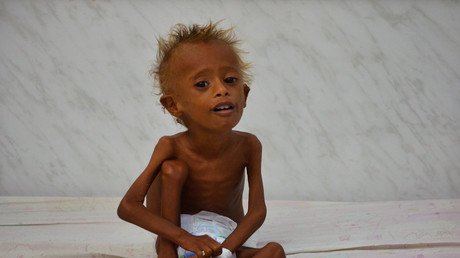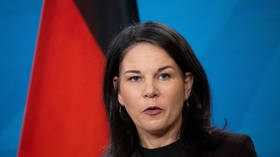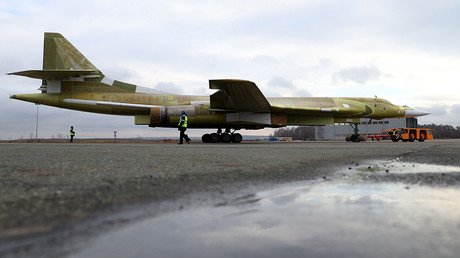Peace in Yemen? Amid fierce clashes, Houthis & Saudis raise hopes with conciliatory statements
Factions from both sides fighting in Yemen's civil war made overtures towards peace on Monday, with the Saudi king voicing support for a peaceful solution after Houthi rebels pledged to end their rocket and drone attacks.
Delivering his annual policy speech to top Saudi officials, clerics and military officers in the capital Riyadh, King Salman gave his full support to UN efforts to bring an end to the fighting.
However, the ageing Saudi monarch justified Saudi involvement in Yemen as "not an option but a duty to support the Yemeni people" from Houthi aggression that is supported by Saudi Arabia's bitter regional rival, Iran.
The Kingdom entered the conflict at the head of a mostly Arab coalition in a bid to restore the internationally-recognized Yemen government, after an uprising by Houthi rebels in 2015 threatened to take full control of the country.
The Saudis are now facing increased pressure from the international community to bring an end to the conflict.
Over 57,000 lives have been claimed in the fighting while a Saudi-led blockade and bombing campaign has left infrastructure devastated, with the importation of aid and supplies made almost impossible.
As a result of the campaign, as many as 14 million Yemeni citizens are at risk of famine, according to a recent report by the UN.
Houthis make the first move
Earlier on Monday, the leader of the Houthi Movement, Mohammed Ali al-Houthi, extended the olive branch towards Riyadh in a statement published on Twitter.
As a show of good faith, al-Houthi said the group's forces had ceased launching rocket and drone attacks into neighboring Saudi Arabian towns, as well as on UAE and Yemeni government targets.
The Houthis had previously justified such attacks as being their only means of response to Saudi domination of Yemen's airspace, and the rising civilian casualties caused by coalition bombing, which has regularly struck non-military targets such as schools and markets.
Al-Houthi added the group was even willing to immediately cease all military operations on all fronts if the Saudis and their allies "really want peace."
The statement said the Houthi's decision was also a show of support for UN Special Envoy Martin Griffiths' efforts to get peace talks back on track, after they were derailed by a Houthi no-show in September.
On Friday, Griffiths said he was willing to escort the delegation from the rebel-held city of Sanaa to attend preliminary peace talks, planned for Sweden at the end of the year.
However, it is a long way from words to deeds and the fighting on the ground has so far shown no signs of waning. Late on Monday, fierce fighting broke out in the suburbs of the Houthi-held port-city of Hodeidah. The Saudis, who declared their commitment to peace earlier the same day, carried out more than ten air strikes against targets in the city, according to Reuters.
'A starting point'
Pointing to potential barriers to peace, Jamal Wakeem, professor of history and international relations at the Lebanese University in Beirut, told RT that he believes the Saudis have always had a "desire to win the conflict purely by military means," something they could resort to if talks stall.
US geopolitical directives could also get in the way, with Wakeem pointing to Washington's desire to have friendly entities in Yemen, due to its strategic location to the Bab-el-Mandeb strait. The waterway links the Red Sea to the Indian Ocean, and through it tankers carry 43 million barrels of oil per day.
"This declaration is a starting point towards establishing a peaceful solution," he said. "But we still have a long process ahead of us."
Military gains would cost too much
The main factor that has prompted both sides to seek reconciliation is that they are locked in a stalemate on the ground, Ammar Waqqaf, Director of the Gnosos think tank, which focuses on Syria and the Middle East, told RT.
“Both parties realize that if they wish to make further military gains on the ground it will come at a very heavy loss,” he said, noting that Washington Post columnist Jamal Khashoggi’s murder and the subsequent general outrage became the ultimate trigger.
“There’s obviously a push for urgency that has come from Khashoggi’s murder,” Waqqaf said. The Saudi King “is pushed by the West in a sense to do something about Yemen.” It’s hard to say now whether Riyadh’s stated intentions are genuine or just a smokescreen, but there’s much at stake, he pointed out.
“[Saudi Arabia] needs to save face while exiting the Yemeni debacle,” Waqqaf noted, adding that it also needs to make sure that other parties at the table, such as Iran, won’t benefit from the bloodshed. For that not to happen, Saudi Arabia needs to “keep Yemen in one piece.”
Like this story? Share it with a friend!














